-
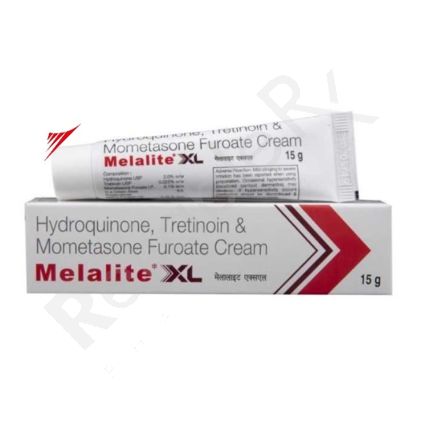 Melalite XL 15gm CreamUS$ 10.83 - US$ 14.00
Melalite XL 15gm CreamUS$ 10.83 - US$ 14.00US$ 10.83
Generic For : Melalite XL CreamActive Ingredients : Hydroquinone (2% w/w) + Mometasone (0.1% w/w) + Tretinoin (0.025% w/w)1 Tube/sUS$ 14.00 -
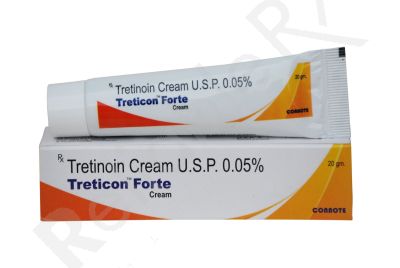 Treticon Forte Cream 0.05% (20gm)US$ 8.08 - US$ 10.00
Treticon Forte Cream 0.05% (20gm)US$ 8.08 - US$ 10.00US$ 8.08
Generic For : -Active Ingredients : Tretinoin1 Tube/sUS$ 10.00 -
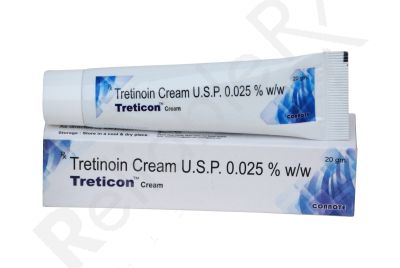 Treticon Cream .025% (20gm)US$ 6.17 - US$ 9.00
Treticon Cream .025% (20gm)US$ 6.17 - US$ 9.00US$ 6.17
Generic For : -Active Ingredients : Tretinoin1 Tube/sUS$ 9.00 -
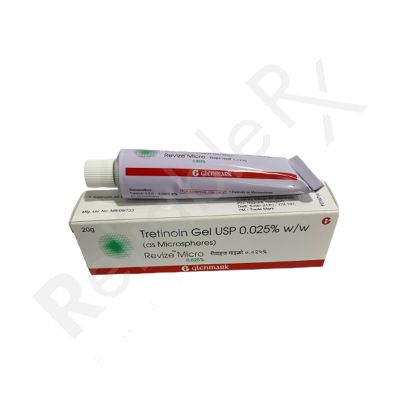 Revize Micro Gel 0.025% (20gm)US$ 9.60 - US$ 15.00
Revize Micro Gel 0.025% (20gm)US$ 9.60 - US$ 15.00US$ 9.60
Generic For : RevizeActive Ingredients : Tretinoin1 Tube/sUS$ 15.00 -
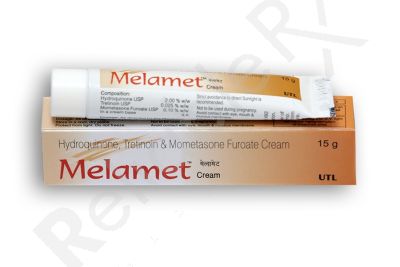 MelametUS$ 9.00 - US$ 11.00
MelametUS$ 9.00 - US$ 11.00US$ 9.00
Generic For : Skin LiteActive Ingredients : Hydroquinone 2%, Tretinoin 0.025%, Mometasone Furoate 0.1%1 Tube/sUS$ 11.00 -
 Salicylix 6% (50gm)US$ 3.71 - US$ 3.73
Salicylix 6% (50gm)US$ 3.71 - US$ 3.73US$ 3.71
Generic For : SalicifixActive Ingredients : Salicylic Acid1 Tube/sUS$ 3.73 -
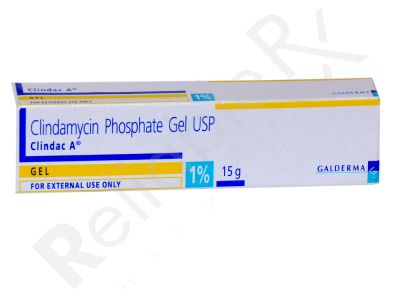 Clindac A 20gmUS$ 6.50 - US$ 7.00
Clindac A 20gmUS$ 6.50 - US$ 7.00US$ 6.50
Generic For : Cleocin TActive Ingredients : Clindamycin Phosphate Gel1 Tube/sUS$ 7.00 -
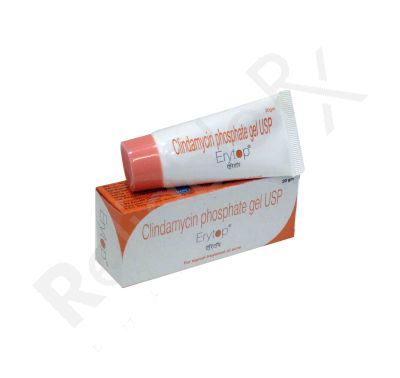 Erytop 1% Gel 20gmUS$ 4.50
Erytop 1% Gel 20gmUS$ 4.50US$ 4.50
Generic For : Cleocin TActive Ingredients : Clindamycin Phosphate Gel1 Tube/sUS$ 4.50 -
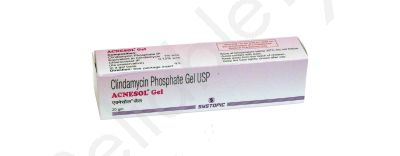 Acnesol Gel 1% (20gm)US$ 3.75
Acnesol Gel 1% (20gm)US$ 3.75US$ 3.75
Generic For : Cleocin TActive Ingredients : Clindamycin1 Tube/sUS$ 3.75 -
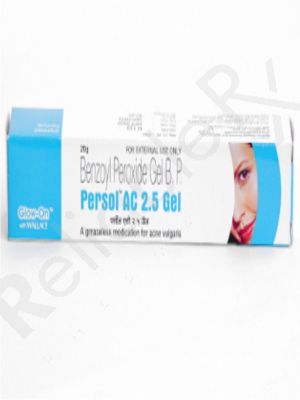 Persol Gel 2.5% (30 gm)US$ 4.00 - US$ 6.00
Persol Gel 2.5% (30 gm)US$ 4.00 - US$ 6.00US$ 4.00
Generic For : BenzagelActive Ingredients : Benzoyl Peroxide1 Tube/sUS$ 6.00 -
 Persol Gel 5% 30gmUS$ 5.00 - US$ 6.50
Persol Gel 5% 30gmUS$ 5.00 - US$ 6.50US$ 5.00
Generic For : BenzagelActive Ingredients : Anhydrous Benzoyl Peroxide1 Tube/sUS$ 6.50 -
 Tazret Forte Cream 0.1% 20gmUS$ 6.47
Tazret Forte Cream 0.1% 20gmUS$ 6.47US$ 6.47
Generic For : Tazorac CreamActive Ingredients : Tazarotene1 Tube/sUS$ 6.47 -
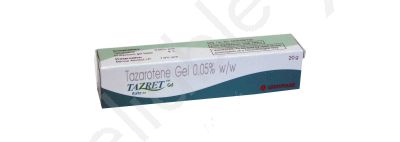 Tazret Gel .05% 20gmUS$ 5.17 - US$ 8.50
Tazret Gel .05% 20gmUS$ 5.17 - US$ 8.50US$ 5.17
Generic For : TazoracActive Ingredients : Tazarotene1 Tube/sUS$ 8.50 -
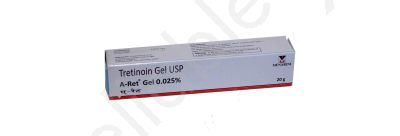 A Ret Gel .025% (20gm)US$ 5.17 - US$ 6.00
A Ret Gel .025% (20gm)US$ 5.17 - US$ 6.00US$ 5.17
Generic For : Retin AActive Ingredients : Tretinoin Gel USP1 Tube/sUS$ 6.00 -
 A Ret Gel 0.1% 20gmUS$ 6.75 - US$ 9.00
A Ret Gel 0.1% 20gmUS$ 6.75 - US$ 9.00US$ 6.75
Generic For : Retin A GelActive Ingredients : Tretinoin Gel USP1 Tube/sUS$ 9.00 -
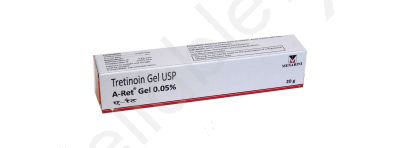 A Ret Gel 0.05% (20 gm)US$ 5.33 - US$ 7.00
A Ret Gel 0.05% (20 gm)US$ 5.33 - US$ 7.00US$ 5.33
Generic For : Retin AActive Ingredients : Tretinoin Gel USP1 Tube/sUS$ 7.00 -
 Supatret .04% Gel 20gmUS$ 7.15 - US$ 9.00
Supatret .04% Gel 20gmUS$ 7.15 - US$ 9.00US$ 7.15
Generic For : Retin A MicroActive Ingredients : Tretinoin Gel Microsphere1 Tube/sUS$ 9.00 -
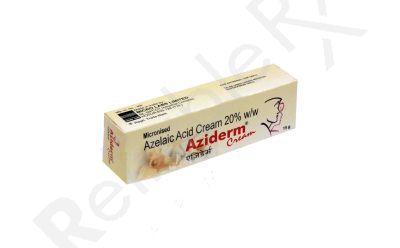 Aziderm Cream 20 % (15gm)US$ 8.67 - US$ 8.68
Aziderm Cream 20 % (15gm)US$ 8.67 - US$ 8.68US$ 8.67
Generic For : Finacea CreamActive Ingredients : Azelaic Acid1 Tube/sUS$ 8.68 -
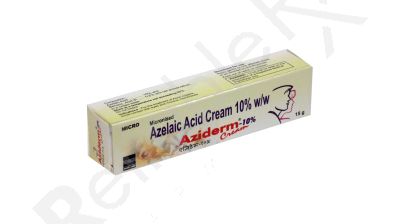 Aziderm Cream 10 % (15gm)US$ 8.01
Aziderm Cream 10 % (15gm)US$ 8.01US$ 8.01
Generic For : Finacea Cream 10%Active Ingredients : Azelaic Acid1 Tube/sUS$ 8.01 -
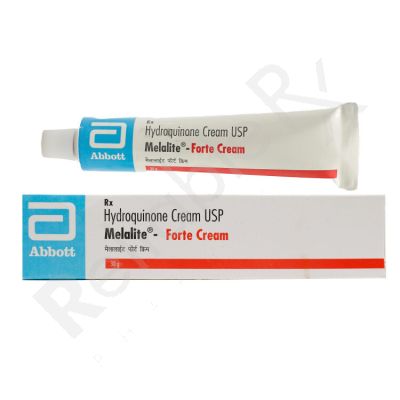 Melalite Forte 4% 30 gm CreamUS$ 6.00 - US$ 12.00
Melalite Forte 4% 30 gm CreamUS$ 6.00 - US$ 12.00US$ 6.00
Generic For : AlustraActive Ingredients : Hydroquinone1 Tube/sUS$ 12.00 -
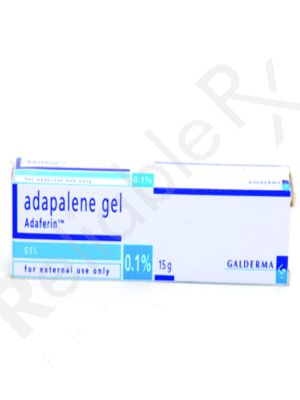 Adaferin Gel 0.1% (15gm)US$ 7.00
Adaferin Gel 0.1% (15gm)US$ 7.00US$ 7.00
Generic For : DifferinActive Ingredients : Adapalene1 Tube/sUS$ 7.00 -
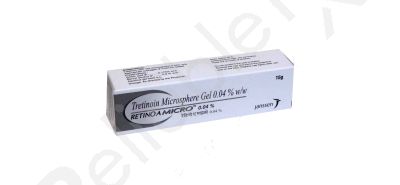 Retino A Micro Gel 0.04% (15 gm)US$ 7.00Generic For : Retino A MicroActive Ingredients : TretinoinSold Out
Retino A Micro Gel 0.04% (15 gm)US$ 7.00Generic For : Retino A MicroActive Ingredients : TretinoinSold Out -
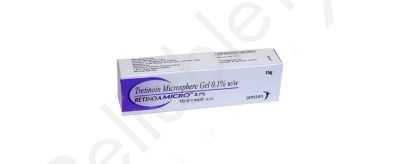 Retino A Micro Gel 0.1% (15 gm)US$ 7.00Generic For : Retino A MicroActive Ingredients : TretinoinSold Out
Retino A Micro Gel 0.1% (15 gm)US$ 7.00Generic For : Retino A MicroActive Ingredients : TretinoinSold Out -
 Retino AC Gel 0.025% 1% (15 gm)US$ 7.00Generic For : VelacActive Ingredients : Clindamycin and TretinoinSold Out
Retino AC Gel 0.025% 1% (15 gm)US$ 7.00Generic For : VelacActive Ingredients : Clindamycin and TretinoinSold Out -
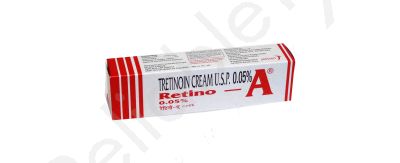 Retino A Cream .05% 20gmUS$ 7.00Generic For : Retin A CreamActive Ingredients : TretinoinSold Out
Retino A Cream .05% 20gmUS$ 7.00Generic For : Retin A CreamActive Ingredients : TretinoinSold Out -
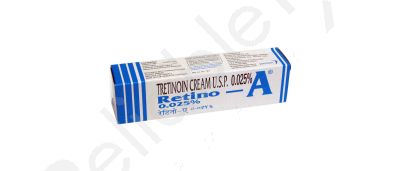 Retino A Cream .025% 20gmUS$ 7.00Generic For : Retin A CreamActive Ingredients : TretinoinSold Out
Retino A Cream .025% 20gmUS$ 7.00Generic For : Retin A CreamActive Ingredients : TretinoinSold Out
ACNE
Acne is a common chronic disorder that affects the hair follicle and sebaceous gland of the skin. In acne-prone skin, there is a blockage of the follicles that results in inflammation. There are several variants of acne. Acne is medically known as Acne Vulgaris.
Acne props up most commonly in adolescence and often continues into adulthood. In teenage acne is usually caused by an increase in testosterone, which builds up during puberty, regardless of sex.
Causes of Acne disease:
Acne is caused by a bacterium known as Propionibacterium Acnes (P. Acnes) that releases an enzyme that breaks down the sebum into fatty acids and causes inflammatory lesions. Many factors aid the formation of Acne:
• Some medications like steroids, androgen, and lithium, can cause acne
• Genetic Susceptibility of a person increases to develop acne during a lifetime if he or she has
a family history of this condition
• Hormonal changes in an adolescent lead to the increase in the release of hormones.
Androgen is a hormone that affects the oil glands in the skin, face, neck, and back. They
stimulate the gland to produce more oil. Excessive sebum can break down the cellular walls in
your pores, causing bacteria to grow and cause lesions.
• Other factors such as an eruption of acne may take place two or three days before the start
of the menstrual period. Stress and pressure from helmets or tight collars can also cause acne
Signs and Symptoms:
• Open and closed uninflamed pimples (blackheads and whiteheads)
• Formation of nodules and pseudocysts
• Inflamed papules and pustules
• Post-inflammatory erythematous
• Pigmented macules and scars
• Adverse social and psychological effects
Adverse effects of the problem:
Acne has various emotional problems associated with it as sometimes acne can leave scars on the face that can downside the confidence of a person.
The person who is suffering from acne for a long time can face several problems like:
• Low self-esteem
• Relationship building problems
• Dilemma at work or school
Similarly, some patients may go into depression or may hint at some behavioral changes due to depression-like:
• Wakefulness
• Loss of hunger
• Weariness
• Feelings of shamefulness
• Mood disorder
• Impulsive crying
• Behavioral troubles
Acne is a very difficult phase for teenagers as they relate the physical appearance of their confidence and acne makes them feel terrible about their appearance. One should not get disheartened like this and remember that acne is very much treatable with the OTC medicines and various prescription drugs that are now available online. Now, you can buy acne products online through various trusted websites.
Preventive measures:
As a preventive measure you should try to establish a daily skin-care regimen, which includes:
• Cleansing and toning your face regularly
• Using skin and hair friendly protective products
• Do not scrub the skin when cleansing
• Always wash your face and skin after sweating
• Minimize the dryness by properly moisturizing the skin
• Use limited amount of makeup
Common Acne medicines:
Following drugs to treat acne are available online at our site you can order the medicines and avail of the periodic offers, if lucky:
• Tazret gel
• Finacea gel
• Aziderm cream
• Retino A cream
• Supatret gel etc.
Myths and facts:
• MYTH: Diet has nothing to do with acne
Fact: diet plays a very important role in acne outbursts. People who ate more sugary foods, dairy stuff, and unhealthy fats, as well as less fish, were more likely to have moderate to ruthless acne.
• MYTH: blackheads are dirt in the pores:
Fact: Actually blackheads have nothing to do with dirt. These are the pores that are blocked due to the oil, skin debris, and proteins. Dirt is not the part of the things that clog the skin pores made to push out the excess oil and debris out of the skin.
Diagnosis of Acne:
A dermatologist carries out the acne diagnosis and first examines the skin to make sure that you have acne because several other conditions are there that look like acne. Several techniques used by dermatologist use to identify the presence of the bacteria causing acne are:
• Pillsbury scale
• Cook's acne grading scale
• Leeds acne grading technique
Treatment for Acne:
Drugs for mild conditions:
Over-the-counter, (OTC) drugs are available in the market that can be brought without the prescription. They help in cleaning and drying up of oily skin. They are present in many forms such as gels, creams, and lotions. For oily skin, alcoholic base gels help in drying. Some of the OTC drugs are as follows:
• Resorcinol that removes blackheads and whiteheads.
• Benzyl peroxide is antibacterial in action and slows the production of excess sebum. It sheds off the dead skin and cleans the skin pores and don’t allows the bacteria to accumulate
• Azelaic Acid reduces inflammation by wiping away the free radicals and reducing bacteria growth. It is indicated in melasma and acne spots
• Tretinoin acts as a peeling agent and increases skin turn over
Drugs for severe conditions
They are employed by dermatologists after doing a deep analysis of your skin condition. Drugs that are given in critical conditions are oral and topical antibiotics, corticosteroid injections, and isotretinoin.
• Oral and topical antibiotics like Erythromycin, Doxycycline, and Clindamycin act by inhibiting
the skin pore blocking the activity of P.acne bacteria and reduce inflammation. Oral antibiotics are administered for six months
• Oral contraceptives like Norgestimate and Ethinyl Estradiol decrease the raised androgen level in the body and combat the excessive production of sebum
• Retinoids like Isotretinoin help in unblocking of pores and prevents the further acne formation. It is given in deep cystic acne or acne that doesn’t respond to the treatment. This drug causes some adverse effects, so there is a need for close monitoring by the skin specialist. Adapalene is a third-generation retinoid and is the approved USDA medicine for the treatment of mild to moderate acne
• Corticosteroid injection is given when there is a bursting of acne that may result in scarring. It will lower the inflammation and speed up the healing process
Other treatment options:
Scar treatment is done by the dermatologist to eliminate the unwanted scars on the face left by Acne. Common procedures are chemical peeling, dermabrasion, laser light treatment, and skin surgeries. Along with this, one can avoid and control acne by doing following self-care strategies.
Steps to improve the health:
Along with this, one can avoid and control acne by doing the following self-care strategies:
• Wash your face routinely twice a day using a gentle cleanser
• Avoid touching your face again & again and wash your hands frequently
• Stress can release hormones that can increase the release of more oil into the skin.
• Don't squeeze, pick, scratch, or rub your skin as it can lead to scarring
• Avoid wearing tight clothes or hats and keep yourself dirt free
• Avoid oil and greasy creams that can increase the oil secretion. Use water-based or non-comedogenic products
• Regular follow up with your dermatologist and keep a record of all the past and present medications.
Important things to know:
Acne is a manageable condition, and the treatment aims to reduce inflammation and keep pores oil and dirt-free. One can buy several OTC (over-the-counter) drugs and Prescription pills online from various reputed sites.
What are the common acne treatments available?
The most prescribed topical acne treatments are retinoid and retinoid-like drugs. Formulations that contain tretinoin (a retinoid) are often useful in treating moderate acne. These are usually available in the form of creams and gels.
What is the best acne medicine?
Commonly prescribed acne medications include benzoyl peroxide and topical retinoids, which are most effective in treating and preventing acne.
What are the common problems with acne medications?
Side effects of acne medications include skin redness, tingly or irritated skin, dry skin, flakiness, peeling of the skin, and increased sensitivity to the sun.
What is the treatment for deep acne scars?
Mostly deep scars need skin surgery and resurfacing. Dermatologists may also use fillers to safely and effectively plump the skin of the depressed acne scars. A dermatologist uses collagen, the patient's fat, or another substance to fill the scar. Many fillers provide temporary results which last between 6 and 18 months.
Which is the best acne spot treatment?
For mild acne spots, tretinoin can be used to decrease the appearance of acne scarring. Since tretinoin speeds up cell turnover on your skin, it can boost new cell growth at the site of scarring.
Is there a permanent solution to cure acne?
Well, it may take too many months or years for your acne to completely clear. Moreover, following a dermatologist can help you permanently cure your acne.
How long can you take oral medicine for acne?
You may be advised to use an antibiotic for the shortest time possible. Acne takes time to treat, usually three to four months. However, some people with acne vulgaris need more time on an antibiotic.
What are the best three acne treatments?
Benzoyl peroxide acts as an antiseptic to cause a reduction in the number of bacteria on the skin's surface.
Tretinoin- It is an effective long-term treatment for acne vulgaris.
Combination therapy- A combination of retinoid formulation and antibiotics is more effective than either agent used alone.
How much time does tretinoin take to work?
One may see results for four to eight weeks. It may take up too many months or years for your acne to be eliminated completely.
What is the most effective anti-acne treatment?
Well, first-line treatment for acne includes benzoyl peroxide or a topical retinoid formulation, a combination of topical medicines combining benzoyl peroxide and a retinoid, an antibiotic (erythromycin or clindamycin), or both.
How to eliminate acne fast?
Remember, acne treatments need time to work. Switching to different products daily can irritate your skin, causing new breakouts. If a treatment works for you, you will notice an improvement in 4 to 6 weeks. Generally, it may take up to two to three months to see a reduction in acne.





20% OFF
On New Registration
Terms and Conditions Apply*
Flat 20% OFF
on your first purchase
20% off only on the product value
Maximum discount value $20
Only one coupon can be used at a time
Coupon code will be mailed on
your registered email address.
Login
Sign up
Flat 20% OFF
on your first purchase
20% off only on the product value
Maximum discount value $20
Only one coupon can be used at a time
Coupon code will be mailed on
your registered email address.
Login
Sign Up
Flat 20% OFF
on your first purchase
20% off only on the product value
Maximum discount value $20
Only one coupon can be used at a time
Coupon code will be mailed on
your registered email address.
Forgot Password ?